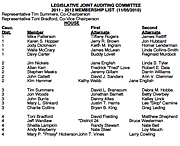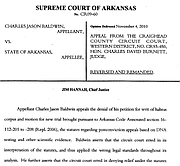Missouri Department of Transportation leaders said two reports released by nonprofits paint a picture of the state's roads and bridges that show Missouri needs to change its trend of under-investment in infrastructure.
TRIP, a national transportation research nonprofit based in Washington, D.C., released a report Thursday that tallies the costs to Missouri drivers of roads that have deteriorated, are congested or that lack some desirable safety features.
For drivers in the Columbia-Jefferson City area, that cost comes to $1,514 annually, according to the report - due to vehicle repair and depreciation costs, tire wear, lost time, wasted fuel and the costs of crashes.
Congestion contributed the largest share of such costs in the Kansas City, St. Louis and Springfield regions, whereas the wear and tear on vehicles from the condition of pavement was the biggest cost factor in the Columbia-Jefferson City area.
The report found 29 percent of major locally and state-maintained roads in the Columbia-Jefferson City area are in poor condition, with another 26 percent in mediocre condition.
Rocky Moretti, director of policy and research at TRIP, said major locally maintained roads are those people drive on once they leave their neighborhoods.
Across the state, the condition of Missouri's roads - more than half of which are in poor condition - cost drivers approximately $8 billion annually, Moretti said.
He also said 9 percent of the state's bridges are structurally deficient, meaning they need immediate repair.
Ed Hassinger, MoDOT's deputy director and chief engineer, who was part of the virtual announcement call Thursday with TRIP - said it "will be critical" Missouri lawmakers soon bolster the department's funding through a 10-cent increase to the state's fuel tax and a change in vehicle registration fees to accommodate for vehicles getting increasingly better fuel mileage.
Hassinger said TRIP's report clearly spells out the costs of doing nothing, and those are reasons to make the difficult decisions to make investments in the transportation system.
The funding challenges presented by the COVID-19 pandemic are short-term ones, he said, "but we are looking long-term," for "continuous, long-term, dependable revenue."
Hassinger said the results of investment into transportation are quickly noticeable, citing Gov. Mike Parson and the Legislature's investment in bridges less than a year ago has already led to 100 bridges getting repaired and being open.
A report released last month by the Reason Foundation - a Los Angeles-based nonprofit think tank focused on advancing free market ideas - found Missouri's highway system ranked second in the country in overall cost effectiveness.
MoDOT Director Patrick McKenna told the News Tribune at the time that a reason Missouri ranks highly in the Reason Foundation's report is the state's under-investment in infrastructure means it doesn't spend much money on roads.
McKenna said he would probably accept a lower ranking if the state could have better rankings in traffic fatalities and percent of bridges in poor condition.
The Reason Foundation's report ranked Missouri as 31st in traffic fatality rates and 33rd in structurally-deficient bridges.
The report ranked Missouri first in total spending per mile - meaning the lowest spending per mile on roads in the country - and first in capital and bridge costs per mile.
McKenna does like some aspects of the Reason Foundation's approach. "We're getting value for the dollars that we are putting in, and that's exactly what we want," he said of what it shows.
He also appreciates the foundation has been releasing its report for 25 years, making it a consistent set of metrics over time, pulled from federal data.
Len Toenjes, president of the Associated General Contractors of Missouri and chair of the Missouri Workforce Development Board, said Thursday that it's best to look at TRIP and the Reason Foundation's reports in conjunction with one another.
"I look at it as an investment, not an expense," Toenjes said of putting more money into infrastructure.
Hassinger added, "We can't cut our way to better roads."



